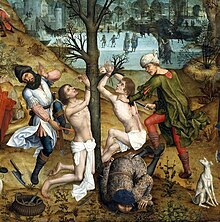
The Battle of Agincourt was an English victory in the Hundred Years' War. It took place on 25 October 1415 near Azincourt, in northern France. The unexpected English victory against the numerically superior French army boosted English morale and prestige, crippled France, and started a new period of English dominance in the war that would last for 14 years until England was defeated by France in 1429 during the Siege of Orléans.

Henry V is a history play by William Shakespeare, believed to have been written near 1599. It tells the story of King Henry V of England, focusing on events immediately before and after the Battle of Agincourt (1415) during the Hundred Years' War. In the First Quarto text, it was titled The Cronicle History of Henry the fift, and The Life of Henry the Fifth in the First Folio text.

The liturgical year, also called the church year, Christian year or kalendar, consists of the cycle of liturgical seasons in Christian churches that determines when feast days, including celebrations of saints, are to be observed, and which portions of Scripture are to be read either in an annual cycle or in a cycle of several years.

Henry V is a 1944 British Technicolor epic film adaptation of William Shakespeare's play of the same title. The on-screen title is The Chronicle History of King Henry the Fift with his battell fought at Agincourt in France. It stars Laurence Olivier, who also directed. The play was adapted for the screen by Olivier, Dallas Bower, and Alan Dent. The score is by William Walton.
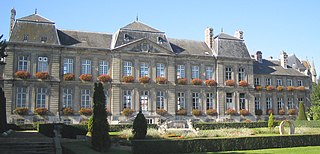
Soissons is a commune in the northern French department of Aisne, in the region of Hauts-de-France. Located on the river Aisne, about 100 kilometres (62 mi) northeast of Paris, it is one of the most ancient towns of France, and is probably the ancient capital of the Suessiones. Soissons is also the see of an ancient Roman Catholic diocese, whose establishment dates from about 300, and it was the location of a number of church synods called "Council of Soissons".
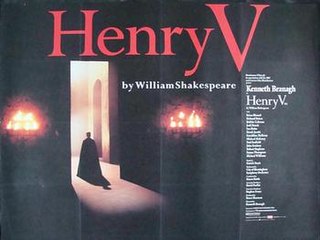
Henry V is a 1989 British historical drama film written and directed by Kenneth Branagh in his feature directorial debut, based on William Shakespeare's history play of the same name. It stars Branagh in the title role of King Henry V of England, with Paul Scofield, Derek Jacobi, Ian Holm, Brian Blessed, Emma Thompson, Alec McCowen, Judi Dench, Robbie Coltrane, and Christian Bale in supporting roles.

Saint Valentine was a 3rd-century Roman saint, commemorated in Western Christianity on February 14 and in Eastern Orthodoxy on July 6. From the High Middle Ages, his Saints' Day has been associated with a tradition of courtly love. He is also a patron saint of Terni, epilepsy and beekeepers. Saint Valentine was a clergyman – either a priest or a bishop – in the Roman Empire who ministered to persecuted Christians. He was martyred and his body buried on the Via Flaminia on February 14, which has been observed as the Feast of Saint Valentine since at least the eighth century.
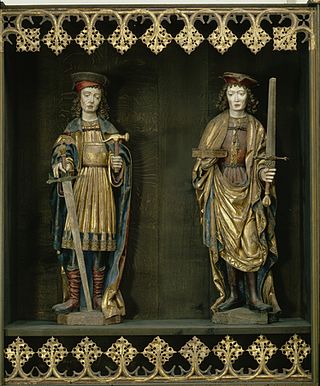
Saints Crispin and Crispinian are the Christian patron saints of cobblers, curriers, tanners, and leather workers. They were beheaded during the reign of Diocletian; the date of their execution is given as 25 October 285 or 286.
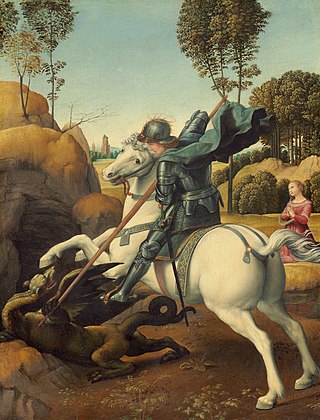
Saint George's Day is the feast day of Saint George, notably England's patron saint, but celebrated also by Christian churches, countries, and regions of which he is the patron saint, including Bulgaria, Ethiopia, Greece, Georgia, Portugal, Romania, Syria, Lebanon, Catalonia, Alcoi, Aragon, and Rio de Janeiro.
Saints in Christianity are a people recognized as having lived a holy life and as being an exemplar and model for other Christians. Beginning in the 10th century, the Catholic Church began to centralise and formalise the process of recognising saints through canonisation.

Prior to the revision of the Anglican Church of Canada's (ACC) Book of Common Prayer (BCP) in 1962, the national church followed the liturgical calendar of the 1918 Canadian Book of Common Prayer. Throughout most of the twentieth century, the situation in Canada resembled that which pertained in much of the Anglican Communion: There was uncertainty as to whether post-Reformation figures could or should be commemorated. In the words of the calendar's introduction, "New names have been added from the ancient calendars, and also from the history of the Anglican Communion, without thereby enrolling or commending such persons as saints of the Church." The 1962 revision added twenty-six post-Reformation individuals, as well as commemorations of the first General Synod and of "The Founders, Benefactors, and Missionaries of the Church in Canada." Of the calendar days, twenty-eight were highlighted as "red-letter days" — that is, days of required observation.
Rictius Varus was a Vicarius in Roman Gaul at the end of the 3rd century, around the time of the Diocletianic Persecution. The Roman Martyrology contains many references to the prefect Rixius Varus, who is said to have persecuted hundreds of Christians. In Christian hagiography he later repented and became a Christian martyr himself, and is regarded a Saint in the Eastern Orthodox and Roman Catholic Churches, with his feast day on July 6.

Azincourt is an historical novel written by Bernard Cornwell, published in 2008. The book relates the events leading to the Battle of Agincourt through its protagonist Nicholas Hook. In the United States, it was published under the title Agincourt.

Fluellen is a fictional character in the play Henry V by William Shakespeare. Fluellen is a Welsh Captain, a leader of a contingent of troops in the small army of King Henry V of England while on campaign in France during the Hundred Years' War. He is a comic figure, whose characterisation draws on stereotypes of the Welsh at that time, but he is also portrayed as a loyal, brave and dedicated soldier.
The Serbs have many traditions. The Slava is an exclusive custom of the Serbs, each family has one patron saint that they venerate on their feast day. The Serbian Orthodox Church uses the traditional Julian Calendar, as per which Christmas Day falls currently on January 7 of the Gregorian Calendar, thus the Serbs celebrate Christmas on January 7, shared with the Orthodox churches of Jerusalem, Russia, Georgia, Ukraine and the Greek Old Calendarists.

Saint George is the patron saint of England in a tradition established in the Tudor period, based in the saint's popularity during the times of the Crusades and the Hundred Years' War.
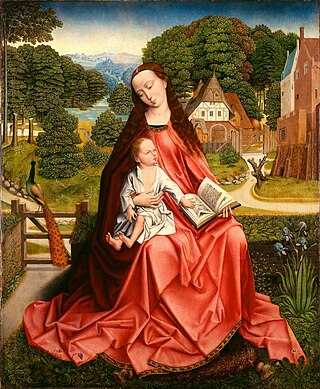
Aert van den Bossche or the Master of the Crispinus and Crispinianus-Legend was an Early Netherlandish painter of altarpieces, active in Brussels and Bruges in the late 15th century. There is still doubt as to whether he should be identified with the Master of the legend of St. Barbara or was only one of the artists active in a workshop responsible for the works of that master.
The St Crispin's Day speech is a part of William Shakespeare's history play Henry V, Act IV Scene iii(3) 18–67. On the eve of the Battle of Agincourt, which fell on Saint Crispin's Day, Henry V urges his men, who were vastly outnumbered by the French, to imagine the glory and immortality that will be theirs if they are victorious. The speech has been famously portrayed by Laurence Olivier to raise British spirits during the Second World War, and by Kenneth Branagh in the 1989 film Henry V; it made famous the phrase "band of brothers". The play was written around 1600, and several later writers have used parts of it in their own texts. It has been compared to the 13th century Baljuna Covenant, a similar oath of mutual loyalty Genghis Khan probably made centuries earlier.
